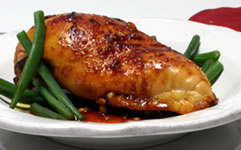It's not really summer if you don't have more tomatoes and zucchini than you know what to do with. But you can never get too much of a good thing.
Both zucchini and tomatoes are high in versatility and nutrition, whether raw or cooked. Zucchini can be simply steamed or broiled with a bit of olive oil, grated Parmesan cheese and an herb like oregano or basil. It's also one of the best vegetables to throw on the grill. Small zucchini and garden-grown summer tomatoes make nice additions to a green salad, and a slice of tomato is a welcomed addition to any sandwich. Grated zucchini is often added to baked goods like muffins and breads for added moisture.
The color of zucchini can vary from dark to light green, and the off-white flesh has a light, delicate flavor. Baby zucchini can be as small as a finger, while the mature vegetable commonly sold at the market is four to eight inches long and two to three inches thick. The smaller the zucchini, the more tender. Choose vegetables with a bright color and unblemished skin.
Some gardens produce giant zucchini that are astonishing to look at but really too big to use as is. If your zucchini is enormous, using a stuffing is the best technique. Parboil it until tender, scoop out and discard the seeds and pithy interior, and fill the shell with diced vegetables, Spanish rice, or other favorite stuffing.
Zucchini is a source of lutein, a cousin to beta-carotene that may protect against certain cancers, vision loss in the elderly, heart attack and stroke. The most concentrated sources of the easily-absorbed lutein are dark green, leafy vegetables like spinach, kale, collard greens and chard. Zucchini is a less concentrated but still excellent source, and studies show that this level is protective.
Tomatoes are a major source of lycopene, a powerful antioxidant. Some studies suggest that people who eat foods high in lycopene may have a lower risk of prostate and other cancers as well as a lower risk of other chronic diseases. The American Institute for Cancer Research emphasizes that eating vegetables in abundance plays an important part in lowering cancer risk.
If your vegetable garden is overwhelmed with zucchini and tomatoes and you've run out of friends, relatives and neighbors with whom to share the bounty, you may welcome new ideas. Try the following recipe, which creates a tasty, light summer dish, or you can take a look at some of the tomato recipes and zucchini recipes in our diabetic recipe archive.
Zucchini and Tomatoes
Yield: Makes 2 servings.
Ingredients:
- Canola or olive oil cooking spray
- 1 small zucchini, sliced 1/4-inch thick
- 1 small onion, sliced into 1/4-inch wedges
- 1-2 Tbsp. water, as necessary
- 2 small tomatoes (or 1 large tomato), cut into wedges
- 1/2 tsp. garlic powder
- Salt and freshly ground black pepper, to taste
- 4 oz. pasta (preferably whole wheat), cooked
Ingredients:
- Spray a large, non-stick skillet with oil and heat over medium heat until hot. Add zucchini and onion and saute, stirring frequently. Add water if vegetables start to stick to the pan. When zucchini and onion are partially tender, add tomatoes and garlic powder, reduce heat to low and cook, stirring frequently, for 3 minutes or until zucchini has reached desired tenderness. Add salt and pepper to taste and serve over hot pasta.
Per serving:
212 calories,
1 g. total fat (less than 1 g. saturated fat),
46 g. carbohydrate,
9 g. protein,
6 g. dietary fiber,
14 mg. sodium.
Diabetic Exchanges:
2 Bread/Starch, 3 Vegetable
AICR










